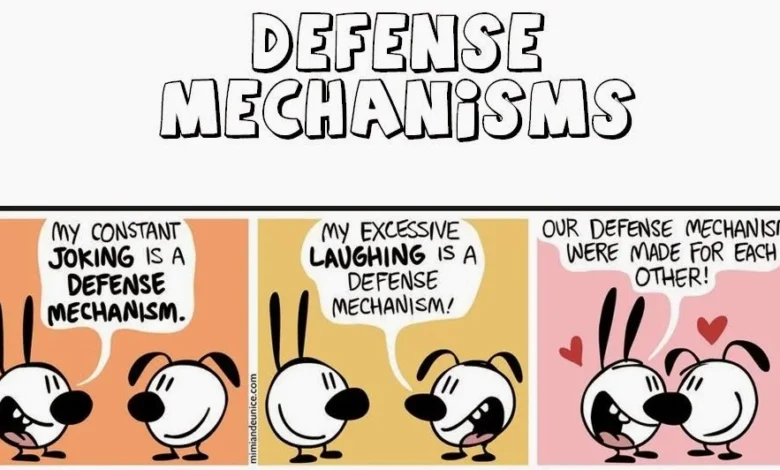Cocky Demeanor and Quick Wit Serve As Defense Mechanisms Paper

Cocky Demeanor and Quick Wit Serve As Defense Mechanisms Paper: In many social settings, individuals project a cocky demeanor or deploy a quick wit to mask vulnerability, deflect criticism, or shield internal anxieties. These traits are not merely personality quirks — in many cases they act as psychological defense mechanisms. Understanding how and why people adopt them helps us see beneath the swagger to the underlying emotional architecture. This article unpacks the interplay between cockiness, wit, and ego protection, exploring how these behaviors develop, function, and sometimes backfire.
Cognitive & Psychoanalytic Basis of Defense Mechanisms
Before dissecting specific behaviors, it helps to ground the concept in psychological theory. In psychoanalytic and psychodynamic frameworks, defense mechanisms are unconscious strategies used by the ego to manage internal conflicts, ward off anxiety, or protect self-esteem. When someone feels threatened—by inferiority, rejection, criticism, or emotional exposure—they may resort to symbolic or behavioral defenses rather than confronting the source directly.
These defenses range from repression, denial, projection, displacement, to more complex ones like reaction formation (expressing the opposite of one’s impulses). A cocky attitude or rapid-fire humor can operate similarly: they distort or deflect threatening internal feelings (insecurity, shame, fear) into more socially acceptable—and even admired—traits.
Thus, understanding cockiness and wit as defense mechanisms means seeing them not just as surface acts of bravado, but as psychological shields constructed to manage internal stress.
Cocky Demeanor: The Mask of Overconfidence
What is a cocky demeanor?
A cocky demeanor refers to an outward display of overconfidence, arrogance, swagger, or an air of invulnerability. It’s the posture of someone who seems to believe they are superior, unflappable, or beyond reproach.
How it functions defensively
-
Projection of power
When someone feels weak or unsure internally, projecting strength outward can create the illusion of control. By acting cocky, the individual attempts to push away the possibility of being challenged or criticized. -
Preemptive dominance
A cocky stance may deter criticism or confrontation. If the person seems confident (perhaps overly so), others may hesitate to question or probe, reducing immediate threat. -
Masking insecurity
Deep down, a cocky individual may fear being seen as vulnerable, unworthy, or incompetent. The outward arrogance is a defensive cover hiding self-doubt. -
Reaction formation or overcompensation
If someone unconsciously harbors feelings of inferiority or fear, they may respond in the opposite direction—acting excessively confident to bury the original anxiety. This is a classic defense mechanism.
Risks and pitfalls
-
Others may perceive arrogance as off-putting or untrustworthy.
-
It can prevent genuine connection, as others might shy away from someone who seems unapproachable.
-
Over time, maintaining a constant front of cockiness can be exhausting, and cracks may appear when challenges or stressors intensify.
In short: cocky demeanor is a protective veneer, often built from fragile foundations.
Quick Wit & Verbal Sparring as Psychological Armor
Quick wit explained
Quick wit refers to mental agility in conversation—sharp comebacks, humorous retorts, clever wordplay, or biting sarcasm. It’s the capacity to “think on one’s feet” verbally.
How it shields the self
-
Deflection through humor
Humor can redirect attention, lighten emotional situations, or defuse tension. A witty remark can steer a conversation away from sensitive topics or redirect probing questions. -
Verbal armor
Wit gives a person verbal leverage, enabling them to respond quickly to challenges or criticism. This fast response protects them from being cornered in argument or exposed by others. -
Assertion of intellectual superiority
A sharp wit can signal intelligence, high status, or verbal dominance, which can deter attacks or criticism. -
Masking emotional depth
By staying in the realm of jokes and quips, a witty person may avoid disclosing deeper emotions, pain, or uncertainties. Wit becomes a buffer against emotional exposure. -
Turning criticism into humor
If someone criticizes you, a clever retort can invert the situation: the attacker becomes the butt of a joke, shifting social power.
Thus, quick wit is not just charm—it’s a verbal defense mechanism shaped to deflect, protect, and control conversational territory.
When Cockiness & Wit Become Maladaptive
Although these traits can function adaptively (in moderation), their persistent use as primary defenses can lead to issues:
-
Superficial relationships
Others may perceive the person as emotionally distant. Relationships may lack depth if the individual rarely opens up beyond surface quips or bravado. -
Emotional exhaustion & breakdowns
Maintaining a mask is draining. If underlying insecurities grow stronger (e.g. through life stressors), the defenses may crumble, leading to emotional breakdowns or sudden intellectual collapse. -
Escalating conflicts
In high-stakes or sensitive interactions, cocky comebacks or witty retorts may backfire—alienating people or inciting stronger reactions than a sincere, vulnerable approach would. -
Avoidance of self-awareness
If one always uses defenses, the chance to confront the root causes (shame, insecurity, trauma) is limited. Growth and healing may stall. -
Misinterpretation by others
Others might misread wit or cockiness as cruelty, arrogance, or lack of empathy, leading to social friction or reputational damage.
Thus, while they can be protective, overreliance risks becoming maladaptive.
Understanding Roots & Triggers
To fully grasp why someone uses cockiness and wit defensively, it helps to examine the psychological roots and situational triggers:
Origins & past wounds
-
Early criticism or judgment — Persons raised in environments with harsh judgment or emotional volatility may learn to defend with verbal weapons.
-
Insecurity or worthlessness — Deep feelings of inadequacy can lead to overcompensation via inflated persona.
-
Trauma or rejection — Past emotional pain often prompts internal self-guards; cockiness and wit can serve as buffers.
Triggering contexts
-
Social scrutiny or evaluation — In situations where performance or judgment is expected (job interviews, dating, public speaking), defenses may amplify.
-
Conflict or challenge — When someone questions or threatens the person’s competence, quick wit or cocky response jumps in.
-
Emotional intimacy — Conversations that probe emotion or vulnerability may trigger defensive shifting to humor or arrogance.
By noticing the patterns—where, when, and with whom these defenses appear—one can begin to dismantle them or channel them more adaptively.
Pathways Toward More Adaptive Expression
Using wit and confidence isn’t inherently bad—many charismatic people employ them well. The key is balance and self-awareness. Here are strategies to transform these defenses into healthier tools:
-
Self-reflection & therapy
Work with a therapist or through journaling to uncover the root insecurities behind the defenses, and develop alternative strategies for vulnerability and authenticity. -
Mindful modulation
Notice when you shift to cocky or witty mode. Pause. Ask yourself: Is this my protection speaking? Then decide whether a more earnest or open response might be better. -
Gradual vulnerability practice
Try disclosing small insecurities or emotions in safe settings. Over time, you’ll feel safer showing parts of yourself without always hiding behind defenses. -
Channel wit positively
Use humor and verbal cleverness not to deflect, but to build rapport, uplift others, or open connection—less as shield, more as bridge. -
Emotional regulation skills
Develop tools (mindfulness, breathing, self-soothing) to tolerate anxiety or discomfort without immediately resorting to defensive posturing. -
Feedback & social calibration
Ask trusted friends or mentors whether your cocky or witty approach sometimes undermines connection. Use that feedback to recalibrate.
With intention, many people realize their charm and verbal talent still shine—just with more emotional authenticity behind them.
Conclusion
A cocky demeanor and quick wit can function as elegant psychological armor, protecting vulnerable self-spaces from scrutiny, criticism, or emotional exposure. In many cases, the swagger and verbal agility are not mere stylistic choices but defense mechanisms rooted in internal insecurity or past wounding.
While these traits can serve a protective role, overreliance may lead to superficial relationships, conflict, or emotional stagnation. The path toward healthier expression lies in turning awareness inward, gradually letting down the defenses, and cultivating depth behind the brilliance.




